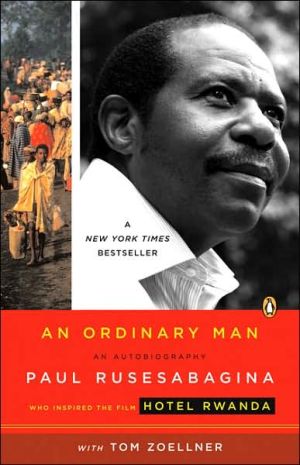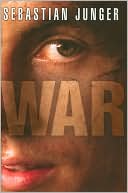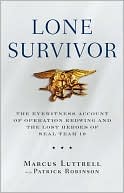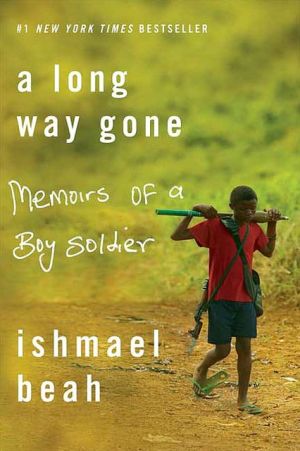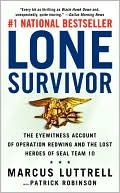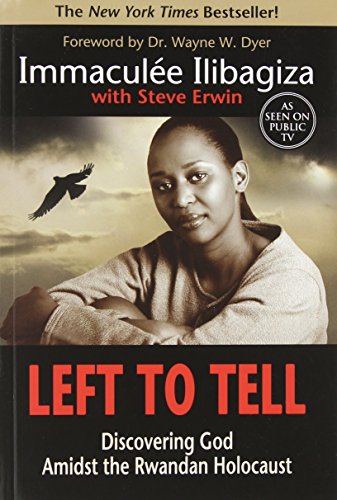An Ordinary Man: An Autobiography
The remarkable life story of the man who inspired the film Hotel Rwanda\ Readers who were moved and horrified by Hotel Rwanda will respond even more intensely to Paul Rusesabagina’s unforgettable autobiography. As Rwanda was thrown into chaos during the 1994 genocide, Rusesabagina, a hotel manager, turned the luxurious Hotel Milles Collines into a refuge for more than 1,200 Tutsi and moderate Hutu refugees, while fending off their would-be killers with a combination of diplomacy and...
Search in google:
The remarkable life story of the man who inspired the film Hotel Rwanda Readers who were moved and horrified by Hotel Rwanda will respond even more intensely to Paul Rusesabagina's unforgettable autobiography. As Rwanda was thrown into chaos during the 1994 genocide, Rusesabagina, a hotel manager, turned the luxurious Hotel Milles Collines into a refuge for more than 1,200 Tutsi and moderate Hutu refugees, while fending off their would-be killers with a combination of diplomacy and deception. In An Ordinary Man, he tells the story of his childhood, retraces his accidental path to heroism, revisits the 100 days in which he was the only thing standing between his “guests” and a hideous death, and recounts his subsequent life as a refugee and activist. Publishers Weekly For former hotel manager Paul Rusesabagina, words are the most powerful weapon in the human arsenal. For good and for evil, as was the case in the spring of 1994 in Rwanda. Over 100 days, some 800,000 people were slaughtered, most hacked to death by machete. Rusesabagina-inspiration for the movie Hotel Rwanda-used his facility with words and persuasion to save 1,268 of his fellow countrymen, turning the Belgian luxury hotel under his charge into a sanctuary from madness. Through negotiation, favor, flattery and deception, Rusesabagina managed to keep his "guests" alive another day despite the homicidal gangs just beyond the fence and the world's failure to act. Narrator Hoffman delivers those words in a stirring audio performance. With a crisp African accent, Hoffman renders each sentence with heartfelt conviction and flat-out becomes Rusesabagina. The humble hotel manager not only illuminates the machinery behind the genocide but delves into Rwanda's complex and colorful cultural history as well as his own childhood, the son of a Hutu father and Tutsi mother. Hoffman successfully draws out the understated elegance of Rusesabagina's simple and straightforward prose, lending the story added vividness. This tale of good, evil and moral responsibility winds down with Rusesabagina visiting a church outside Kigali where thousands were massacred and where a multilingual sign-cloth now pledges, "Never Again." He once more stops to consider words, the ones he worries lack true conviction-like those at the church-as well as the ones with the power to heal. For the listener, the words of Paul Rusesabagina won't soon be forgotten. Simultaneous release with the Viking hardcover. (Apr.) Copyright 2006 Reed Business Information.
An Ordinary Man\ \ By Paul Rusesabagina Tom Zoellner \ Viking Adult\ ISBN: 0-670-03752-4 \ \ \ Chapter One\ I WAS BORN on the side of a steep hill in the summer of 1954. My father was a farmer, my mother his helper. Our house was made of mud and sticks. We were about a mile away from the nearest village. The first world I can remember was green and bright, full of cooking fires and sisters murmuring and drying sorghum and corn leaves in the wind and the warm arms of my mother. \ Our house had three rooms. There were small windows with pieces of hinged wood to keep out the sun and rain. The house was built on an incline of terraced farms, but the small yard outside was flat. My mother kept it swept clean of seedpods and leaves with a homemade broom made out of bundled twigs. When I grew old enough she would let me help her. I still remember the happiness I felt on the day when she trusted me to do it by myself.\ From the courtyard you could look south across the winding Ruvayaga Valley to the opposite hill. It seemed an awesome distance, like looking into another country. The hill was laced, as ours was, with houses made out of mud and stucco and baked red tiles, dots of cattle grazing, the groves of avocado plants, and the paddlewide leaves of the banana trees that practically sparkled in the sun. On a perfect day you could lie in the grass near our home and see people at work in the fields on the next hill. They looked like ants. Every now and then somebody's machete would catch the angleof the sun and you'd see the winking of metal across the valley. And far, far in the distance you could make out the clustered roofs of the village called Gitwe, where my parents told me I would one day learn how to read and write, which neither of them could do.\ We spoke the beautiful language of Kinyarwanda, in which I first learned the names of the world's many things in rich deep vowels made in the back of the mouth. Bird, inyoni. Mud, urwoondo. Stones, amabuye. Milk, amata.\ To enter our house through the front door you had to step up on a stoop made of gray rocks. It couldn't have been more than two feet off the courtyard, but it seemed like a towering height. I used to climb in on my hands and knees. To the side of the door was a flat stone used for sharpening machetes. There was a shallow depression in the middle where rainwater would collect. After a storm I would splash my hands around in the cool water, putting it on my face and letting it dribble down my cheeks. It was the best part of the rain. When those storms came in September the lightning and thunder scared me. My three younger brothers and I would sometimes huddle together during the worst ones. And then we would laugh at each other for our cowardice. Thunder, inkuba.\ My parents raised nine children altogether, and I was an island in time's river, separated by six years from my older sister and five years from my younger brother. I got a lot of attention from my mother as a result, and trailed her around the house hoping she would reward me with a chore. The firmament of our relationship was work; we expressed love to one another in the thousands of little daily actions that kept a rural African family together. She showed me how to take care of the baby goats and cows, and how to grind cassava into flour. Even when I came back to visit my parents when I was grown it would be only minutes before I would find myself holding an empty jerrican and going to fetch well water for my mother.\ There was a narrow path from the main road that twisted up the side of the ridge and passed through groves of banana trees. I had learned how to walk on this path. It was our connection with a small village called Nkomero, which occupies the top of one of the hundreds of thousands of hills in Rwanda. The nickname for my country is "the land of thousands of hills," or le pays des mille collines, but this signifies a gross undercount. There are at least half a million hills, maybe more. If geography creates culture, then the Rwandan mind is shaped like solid green waves. We are the children of the hills, the grassy slopes, the valley roads, the spider patterns of rivers, and the millions of rivulets and crevasses and buckles of earth that ripple across this part of Central Africa like the lines on the tired face of an elder. If you ironed Rwanda flat, goes the joke, it would be ten times as big. In this country we don't talk about coming from a particular village, but a particular hill. We had to learn the hard way how to arrange our plots of corn and cabbage into flat terraces on the sloping ground so as not to turn a farm into an avalanche. Every inch of arable land is used this way. The daily walk up to a family grove can be an exercise in calf-straining misery going up, and in thigh-wracking caution going down. I think our legs must be the most muscular on the African continent.\ There is a story about the conqueror of Mexico, Hernon Cortes, who was asked by the king of Spain to describe the topography of the rugged new nation. Cortes reached for the map on the table and crumpled it up into a ball. "That," he said, "is what Mexico looks like." He could just as easily have been talking about Rwanda. If you didn't grow up here you would be likely to get very, very lost among those seductive hills and valleys.\ Our family had rows of sorghum and bananas planted on the slopes of two hills, which made us solidly middle class by the standards of rural Africa in the 1950s. We would have been considered quite poor, of course, when viewed through the lens of a European nation, but it was all we knew and there was always plenty to eat. We worked hard and I grew up without shoes. But we laughed a lot. And I knew there was love in my family before I knew the word for it.\ I think the greatest hero in my life was my father, Thomas Rupfure. He was already an old man, well into his sixties, when I was a child, and he seemed impossibly tall and strong. I could not comprehend that I could one day be his age, or that he was once mine. I assumed he had always been old.\ I never once heard him raise his voice. He didn't need to. He always spoke without apology or flourish and with a calm self-possession. If he and my mother ever fought I never knew it. On special days he would fold my hand into his and take me up the winding path to the top of the hill, and then down the rutted road that led to the village, where we would go to buy sweet potatoes or bags of corn. We walked past the houses of our neighbors, and he would greet each one with a gentle nod. Anyone who engaged my father in conversation was likely in for a long story. He loved to talk in proverbs. It was the way he understood the world and his favorite way of dispensing wisdom. Here's an example: Somebody might tell him a story about being taxed at too high a rate by the mayor, and he would start talking about a lamb and a dog drinking out of the same river. The dog accused the lamb of dirtying his water, but the lamb pointed out that that was impossible, since the dog was upstream. The dog then said that the lamb must have dirtied the water yesterday, and the lamb pointed out that that was also impossible, because he had not been in the meadows yesterday. Then it must have been your brother!, said the dog, and he proceeded to devour the lamb. The moral of the story was that any excuse will serve a tyrant. I would have cause to remember that tale much later in life.\ There was not much to our village of Nkomero, then or today. There is a commune house, which is synonymous with town hall. There is a small Roman Catholic church. There are a few stores that sell bags of sugar, salt, and soft drinks. There is a tavern where men lounge and drink the potent beer made from bananas. A car or a truck coming through was a big event. Behind the wheel, very often, was a white man-a European missionary or a doctor. Muzungu! the children would call, a word that means "white man," and they would say it with relish. It was not meant as an insulting word, just a descriptive one, and the white people would smile back at us. We were always hoping for a toss of candy or a ballpoint pen, which would sometimes come and sometimes not.\ The road wound past the church and the tavern and on along the ridgetop through a grove of eucalyptus trees on the other side of the Ruvayaga Valley, tracing a long horseshoe shape all the way to the next village, Gitwe. I would walk these two miles literally thousands of times while growing up, so many times that I could practically do it blindfolded, knowing where the road turned just by counting the number of steps I had taken. It was an important symbol in my life, this rutted track that connected my home with my school. It was where I first understood that in order to make progress as a man you had to take a journey. There was only so much you could learn at home before you had to get out in the world and prove what you could do.\ It was my father who first took me down this road to the school at Gitwe when I was eight years old, and I still remember him handing me off to the assistant principal and saying good-bye. I suppose it should have been a troubling moment for me-it was the first time I was leaving my parents' care-but I was eager to begin the adventure of learning. My father had told me over and over again: "If you are willing to do it, you will be successful." I was experiencing a privilege he had never had and I know now that he was sending a little piece of himself with me that day.\ Perhaps it had something to do with growing up with such a large family, but I found that I could get on well with the new kids in my school. We played soccer, of course, and racing games to see who could run the fastest. Another game was a variation of capture the flag in which the idea was to venture inside enemy territory and grab one of their sticks without being caught.\ One strange game I remember in particular was called igihango, which is a word loosely translated in English as "trust." There were no clearly defined rules to this game, and I'm not sure you could even call it a game in the classic sense of the word. The idea was that you made a secret agreement to be friends with a particular kid, only you weren't supposed to tell anybody else about it. Other kids tried to make you confess your igihangos by holding you down and tickling you or poking you in the ribs or whatever other kind of boyish sadism they could dream up. I was always very good about keeping my igihango confidences to myself, at least verbally, but I think I always exposed them when I ran to save one or another of my secret allies from being interrogated. I probably should have been more subtle.\ When I went home from school in the evenings I would help my mother cook supper. My brothers and I used hoes to carve out brick-shaped pieces of dirt and we built a kind of domed oven out of them. We stuffed a bunch of sweet potatoes inside and then lit a small fire underneath them. They came out charred and delicious. Every oven was used only once. We kicked it back into the ground, so as to bury the ashes, and then built a new one the next night.\ Our suppers always came with small tastes of a bitter and delicious beer made out of the juice of bananas. Let me tell you about this drink, which we call urwagwa. Visitors to Rwanda always complain that it tastes like spoiled buttermilk, but I think it is tasty. It plays a central role in Rwandan social life, and is also an important symbol of the good-heartedness and collegiality that I think represents the best side of my country. There is a saying: "You never invite a man without a beer." It is the symbol of hospitality, a way of saying without words, "You are my friend and I can relax in your presence."\ Brewing banana beer is like the art of friendship: simple and very complicated at once. First you dig a pit in the earth. Because Rwanda is just a few miles below the equator, the ground temperature is always warm. It acts like a very slow, gentle oven for the fermentation. You take a bunch of ripe bananas, as many as you want, and bury them about four feet deep. You make a lid for the pit out of the broad leaves of the banana tree. Come back in three days and dig them up. They should be very overripe. You transfer the mushy fruit to a basin made out of a hollowed tree trunk and then press down on them using handfuls of tough grass as your gloves. You drain out the juice into a clay pot, strain out the chunks, mix it with sorghum flour as a fermenting agent, let it sit for about a month, and then you have your banana beer.\ It is a simple recipe, but it takes years of practice to get it right. You have to feel your way around and make mistakes. This is normal. We have all tasted bad beer. Sometimes the banana juice comes out too light and you have to put it over a fire to reduce the quantity. Sometimes the juice comes out too potent and you have to add water. Almost every house in Rwanda has a yellow plastic jug of banana beer tucked somewhere on the premises. It is like a mailbox in America or a teapot in England; everyone has to have one.\ The beer is not really the important part; it is the friendship that it cements. Everywhere in my country you see people talking and laughing over bottles of banana beer. It most often happens at what we call cabarets, which are an indispensable part of life in rural Africa. They are like a bar and a convenience store combined, sometimes made of nothing but a few planks of wood. You see them on the sides of roads, in the suburbs, and even in the smallest little villages. Here you can buy canned goods, soap, soft drinks, batteries, toys, and all kinds of other things. The most important part of the cabaret is the front, where the owner has set out chairs, benches, and maybe even an old, ratty couch. This is where the local people, no matter what their station in life, will come together for a round of banana beer, often sipped through the same red straw. It is very hard to hate someone with whom you have shared a beer. There is too much laughter and good feeling between you. Even people who might be predisposed to be enemies will come together over a beer.\ Perhaps this simple act taps into something in our national memory. Banana beer is known as "the drink of reconciliation." It plays an important role in our traditional local court system, known in the Kinyarwandan language as gacaca, or as it is loosely translated, "justice on the grass." If somebody had a problem with a neighbor he would not seek revenge. He instead brought it to the attention of a group of men who we called elders. They were not elected in the classical sense of ballots, but they were put in a position of leadership by a kind of unspoken common assent. To be an elder you had to have a reputation for fairness and sober judgment, something that would only become apparent over time. It was apparent in the way you lived your life. Hard-liners and loudmouths did not get to be elders.\ The elders would invite the village to come sit under the shade of a tree and hear the opposing sides tell their stories. Almost all of the disputes concerned property. A stolen goat, for instance, or somebody trying to grow crops on a hill that belonged to another family. More serious cases-such as those involving violence-were always referred to the courts, but village elders were given wide latitude to help solve local problems.\ After the two enemies had finished speaking, the elders would give their opinions, one by one, on what should be done to remedy the problem. It usually involved compensation. A typical punishment for a stolen goat would be to repay the man a goat-and then give him another as a fine. Somebody bringing a charge thought to be false would be ordered to pay the man he had slandered. Confession was always the key. The village put a high value on the act of admitting culpability, even if you were the one bringing the case. It was viewed as a necessary step in the process of absolution. A man who lied before the entire village knew that he would have to wear that lie for years to come. There was an enormous incentive to come clean, and very little penalty was meted out for being honest with the public, and with yourself.\ Then came the most important part of justice on the grass: The two aggrieved men were required to share a gourd of banana beer as a sign of renewed friendship. There were usually no lasting scars because it was hard to stay angry at someone who had humbled himself before you. The adversarial system of justice practiced in the West often fails to satisfy us, I am convinced, because it does not offer warring parties the opportunity to be human with each other at the end. Whether you were the victim or the aggressor you had to strip yourself of pride and recognize the basic humanity of the fellow with whom you were now sharing a banana beer. There was public shame in this system, true, but also a display of mutual respect that closed the circle. Everyone who showed up to hear the case was invited to sip the banana beer too, as a symbol of the accused man's reconciliation with the entire people. It was like a secular communion. The lasting message for all that gathered there was that solutions could always be found inside-inside communities and inside people.\ (Continues...)\ \ \ \ \ Excerpted from An Ordinary Man by Paul Rusesabagina Tom Zoellner Excerpted by permission.\ All rights reserved. No part of this excerpt may be reproduced or reprinted without permission in writing from the publisher.\ Excerpts are provided by Dial-A-Book Inc. solely for the personal use of visitors to this web site. \ \
\ From Barnes & NoblePaul Rusesabagina is a most extraordinary "ordinary man." During the 1994 Rwandan massacres, this humble hotel manager maneuvered successfully to save the lives of his 1,268 countrymen. Others were not so lucky: Beyond the Kigali hotel walls, approximately 800,000 were slaughtered, most of them hacked to death by machete. As the son of a Hutu father and Tutsi mother, Rusesabagina grew up keenly aware of relations, hostile and otherwise, between these two groups. His recollections show how this seemingly spontaneous genocide reflected growing conflicts in Rwandan politics and society. It should be no surprise that his heroic personal story became the inspiration for the film Hotel Rwanda. A powerful story of bravery in the midst of madness.\ \ \ \ \ Publishers WeeklyFor former hotel manager Paul Rusesabagina, words are the most powerful weapon in the human arsenal. For good and for evil, as was the case in the spring of 1994 in Rwanda. Over 100 days, some 800,000 people were slaughtered, most hacked to death by machete. Rusesabagina-inspiration for the movie Hotel Rwanda-used his facility with words and persuasion to save 1,268 of his fellow countrymen, turning the Belgian luxury hotel under his charge into a sanctuary from madness. Through negotiation, favor, flattery and deception, Rusesabagina managed to keep his "guests" alive another day despite the homicidal gangs just beyond the fence and the world's failure to act. Narrator Hoffman delivers those words in a stirring audio performance. With a crisp African accent, Hoffman renders each sentence with heartfelt conviction and flat-out becomes Rusesabagina. The humble hotel manager not only illuminates the machinery behind the genocide but delves into Rwanda's complex and colorful cultural history as well as his own childhood, the son of a Hutu father and Tutsi mother. Hoffman successfully draws out the understated elegance of Rusesabagina's simple and straightforward prose, lending the story added vividness. This tale of good, evil and moral responsibility winds down with Rusesabagina visiting a church outside Kigali where thousands were massacred and where a multilingual sign-cloth now pledges, "Never Again." He once more stops to consider words, the ones he worries lack true conviction-like those at the church-as well as the ones with the power to heal. For the listener, the words of Paul Rusesabagina won't soon be forgotten. Simultaneous release with the Viking hardcover. (Apr.) Copyright 2006 Reed Business Information.\ \ \ Library Journal"Today I am convinced that the only things that saved those people in my hotel was words," says Rusesabagina of the 12,000 Tutsis and Hutu moderates he sheltered during Rwanda's genocidal violence in the early 1990s. Now, thankfully, we have not just his words but a whole book. With a 12-city tour. Copyright 2005 Reed Business Information.\ \
